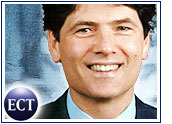
Earlier this fall an MBA student from MIT’s Sloan School gave me a call.He wanted to invite me to be a panelist at the Seventh Annual MITVenture Capital Conference. The conference was run by students and ispart of something called MIT Innovation Week.
This is a big deal in the Boston venture capital and technology circles andbeyond. For example, one of theother highlights of the week was a $50,000 entrepreneurship competitionin which students’ business plans are judged and the best get somefunding. There was also a lot of attention given to China and India.
They wanted me to sit on a panel that discussed the future of thesoftware industry. I was impressed and flattered, and of course I said yes.
This year’s overall theme was “The Challenge of Convergence: Winning inan Uncertain World.” While there were tracks and panels on software andbiotech, the real buzz was about the idea of converging products aroundmultiple forms of media and tie-ins with the entertainment industry.
From the venture capital perspective, I learned that software andbiotech are topping out — either cyclically, in the case of biotech, oras long-term propositions, in the case of software.
On my panel, where I was the only panelist not sitting on millions ofinvestment dollars, the general consensus seemed to be that all the goodideas are already taken. It’s hard to find good places to put moneybecause there aren’t any really interesting business processes left thatare waiting to be automated. At least that’s the way it was presented.Hosting might offer some interesting opportunities, but of course theeconomic model is a challenge. I had a different take on the subject,but I was the minority voice. Oh, well.
Group Dynamics
For me, the conference was at least as interesting for the culturaldynamics on display, and I learned quite a lot. First, there were theventure capitalists. My idea of a VC is of someone who keeps hisor her own counsel, who uses the tools of financial and technologyanalysis to find investments in emerging companies and makes aninvestment based primarily on a belief in the company’s vision of thefuture. While I have no doubt that that’s true to a degree, at the conferencethe VCs sure seemed to be engaging in pack behavior. But I guess it’snecessary to understand the dynamics of the pack if you need to time aninvestment so that it matures at the peak of a market cycle.
I sat through a session on the biotech industry, and toward the end theytook questions from the audience. One of the last questions wasa real eye-opener for me. Someone asked the panel when in a company’slife cycle it was best to seek venture funding. The group’s consideredopinion was that it was never too early. “If the money’s available, whynot take it?” one of the VCs on the panel said. I had always heard andbelieved that getting venture money was something like having sex inhigh school — it’s a nice thing to brag about, but there are downstreamramifications that you need to consider carefully.
Another dynamic that was fun to watch was the subtle inculcation of ahealthy disrespect for regulation. Several times I heard phrases like,”This event was organized by the students without any ‘help’ from thefaculty” or “the so-called administration” — and this was from seniorfaculty members. It’s amazing how little time we waste indoctrinatingbright young students with the idea that privateinfrastructure is always good and public infrastructure is always bad. Ibet the faculty thinks differently about the so-called administration onpay day or when they need to have an office painted.
Convergence
But the main event was convergence, on which I am a skeptic. There aremany types of convergence, and quite a few don’t make much sense. Mybible on the subject is a recently published book by Al and Laura Ries,two acclaimed marketing experts with a long track record to give themcredibility. The book is The Origin of Brands, and its thesis isthat great new products get started not through convergence but throughdivergence.
Convergence products are like the Swiss Army knife. Lots of people havethem, but rarely are they used. The knife has a knife and fork, but theyare always a last resort because regular knives and forks work a lotbetter. It seemed to me that this conference was a little too taken byits anticipation of the brave new world of digital convergence — theSwiss Army knife of multi-media and entertainment or “content.”
Convergence of digital media will make entertainment ubiquitous. But,frankly, I worry about a society whose growth industry is entertainingitself. One VC said that if you want to know about the future ofconverged technology, you should look at a teenager sitting in his orher room simultaneously surfing the Web, instant messaging, and talkingon the phone. I have teenagers and can attest to that reality. For meperhaps there’s a remedial course available, maybe called Stress 101.
Personally, I wish all of us had attended the workshop called “GlobalTies 2004: India and China’s Entrepreneurial Trajectory.” There we mighthave glimpsed another future, and we might not have liked it. Maybe it’savailable on DVD.
Denis Pombriant is former vice president and managing director of Aberdeen Group’s CRM practice and founder and managing principal of Beagle Research Group. In 2003, CRM Magazine named Pombriant one of the most influential executives in the CRM industry.






















































